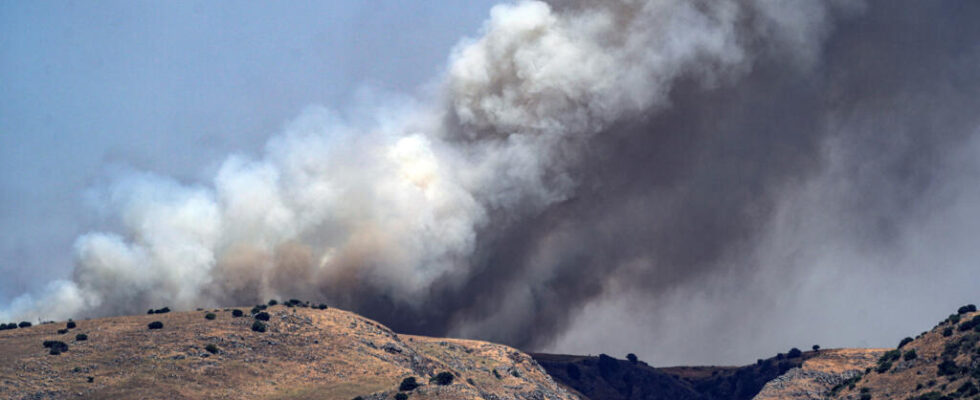The situation, already worrying, deteriorated on the front between Lebanon and Israel on Thursday June 13. Two days after the death of several members of Lebanese Hezbollah in an Israeli raid, the pro-Iranian movement and ally of Hamas responded by launching a shower of rockets on Israeli territory within 48 hours. Faced with the continued and sustained increase in hostilities, the various actors are concerned about a possible general conflagration in the region.
4 mins
For the second consecutive day, Hezbollah deployed unprecedented firepower to support Hamas in Gaza and to avenge the death of several members of the group, including its most important commander in South Lebanon, Taleb Abdallah. The latter was killed by an Israeli raid on the evening of Tuesday June 11reports our correspondent in Beirut, Paul Khalifeh.
At the end of the afternoon, and for the second time that day, Hassan Nasrallah’s party launched a squadron of assault drones against an Israeli army barracks in Galilee. In the morning, the pro-Iranian Lebanese formation carried out a combined rocket and drone operation: for 40 minutes, salvos totaling more than 150 rockets and a squadron of 30 suicide drones fell on 10 targets simultaneously.
The firepower used by the Israeli army had nothing to envy of that of Hezbollah. Lebanese security sources indicated that Jewish state artillery attacked three localities with white phosphorus in the central sector of the border, in addition to six other areas targeted with large-caliber shells. Israeli fighter planes and drones targeted seven other localities at different points along the 120 km front.
Around 90,000 Lebanese civilians have been displaced from communities near the Israeli border.
Read alsoLebanon: a senior Hezbollah commander killed in an Israeli raid 25 km from the front
Fear of a real war »
A senior American official, quoted by Reuters, said that the United States is “ very concerned that the hostilities on the border between the two countries could degenerate into a full-blown war “.
The head of Iraqi diplomacy Fouad Hussein also warned, during a meeting in Baghdad with his Iranian counterpart Ali Bagheri Kani, against “ hazard » of an expansion of the conflict in southern Lebanon. The Iranian minister, for his part, reiterated the refusal to see the war in Gaza ignite the entire Middle East. The facts on the ground this Thursday seem confirm the fears expressed.
Same story with the United Nations Peacekeeping Force in Lebanon (UNIFIL), deployed for decades in southern Lebanon: it fears an escalation. “ The situation is not sustainablealarms Kandice Adriel, one of its spokespersons. As a peacekeeping force, we call on everyone to silence the guns and engage in de-escalation. Until the stage where the belligerents can move towards a political and diplomatic solution. »
Kamel Mohanna is also concerned. Originally from southern Lebanon, he founded the humanitarian NGO Amel which intensified its operations from the start of the Israel-Hezbollah conflict last October. “ When there were events in the south (of Lebanon) on October 8, we reinforced our existing centers in the border region. There are thousands of homes that have either been destroyed or partially damaged. So we are doing a huge amount of work. The needs are much greater than the means available in Lebanon. Obviously, until now, conflicts in the region have been limited geographically, but anything can happen. So we prepared for an even more serious situation, especially in Lebanon. »
“ No major development »
But for Yossi Kuperwasser, the intensification of bombings from both sides this week does not necessarily mean conflagration. According to the researcher at the Jerusalem Center for public Affairs, “ we witness episodes that are more intense than others “, but ” we are still in the middle of a gradual and controlled escalation », he analyzed to our correspondent in Jerusalem, Sami Boukhelifa.
There isn’t really any major development. We are still in the middle of a gradual and controlled escalation in the north. This has been the same situation since October 8, the day after the Hamas attack on Israel, and the start of the war in Gaza. Sometimes we witness episodes that are more intense than others, and we have just experienced one. Israel eliminated a senior Hezbollah officer, and Hezbollah responded by massively bombing northern Israel. It is not a surprise. So I would say we are still at the same point. Above all, we are approaching the fateful moment when we will have to decide what we intend to do on our northern border with Hezbollah. Two possibilities: win the war in Gaza and hope that this victory will be an asset that allows us to conclude a cessation of fighting with Hezbollah which will move away from our border. Otherwise, it will probably be necessary to wage war against Hezbollah.
According to Yossi Kuperwasser, researcher at the Jerusalem Center for Public Affairs, “we are witnessing episodes that are more intense than others,” but “we are still at the same point,” that is, “in the middle of a gradual and controlled escalation.”
Read alsoIntensification of fighting with Hezbollah: northern Israel burns
